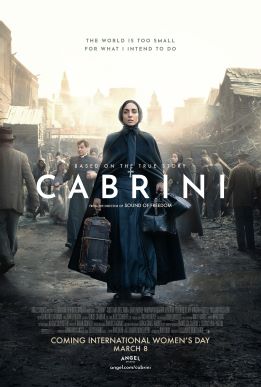Cabrini, reviewed by William De Arteaga
Cabrini (Angel Studio, 2024). The newly released movie, Cabrini, is the story of St. Mother Frances Xavier Cabrini. She was an Italian nun who immigrated to New York in 1888 to serve the destitute Italian immigrants streaming into America. Their social and economic position was even lower than the Irish immigrants who were beginning to […]
 Cabrini (Angel Studio, 2024).
Cabrini (Angel Studio, 2024).
The newly released movie, Cabrini, is the story of St. Mother Frances Xavier Cabrini. She was an Italian nun who immigrated to New York in 1888 to serve the destitute Italian immigrants streaming into America. Their social and economic position was even lower than the Irish immigrants who were beginning to move up in society.
Orphaned Italian children lived in unspeakable squalor in the cellars of rundown apartment buildings, and Cabrini’s first task if to establish an orphanage for such children. After success in that project, she moved on to found one of the great hospitals of New York City to specifically serve the poor immigrants of the city. She accomplished all of this despite tremendous opposition from secular and religious sources. The Catholic Archbishop of New York wished to banish Mother Cabrini back to Italy because she was upsetting his delicate balance of power (and accommodations) with the WASP [White Anglo-Saxon Protestant] establishment of New York. All of this is presented with marvelous cinematography and wonderful acting. Mother Cabrini is played wonderfully by an experienced Italian TV star, Cristiana Dell’Anna, whose steely eyes and iron determination face down every obstacle, and opponent—including the powerful mayor of New York.
Cabrini is a great film, but spiritually flawed. Mother Cabrini is pictured as woman who accomplished magnificent things through strength of character, intelligence, and unwavering determination. All of that is correct, but it excludes the element of prayer from her life and that of her nuns. Behind every major obstacle overcome, for instance, the arson of her hospital, there were her prayers and those of her nuns that were not shown. The sisters had a rule of life that mixed works, as in aiding teaching and nursing the poor, with prayer. The former was shown in detail, but the latter ignored. The name of Jesus is not mentioned in the film even though her religious order was called “The Missionary Sisters of the Sacred Heart of Jesus,” and they had great devotion to Him. Mother Cabrini becomes then a model feminist of the modern, secular sort. This is a distortion of her life. Her determination and intelligence and actions were empowered by a prayer life that made miracles of timing, political influence and favor shown in the movie.
I recommend that all Christian see this movie, but keep in mind there are other aspects of the story that have not here been told.
Reviewed by William De Arteaga
Official website: https://www.angel.com/movies/cabrini




